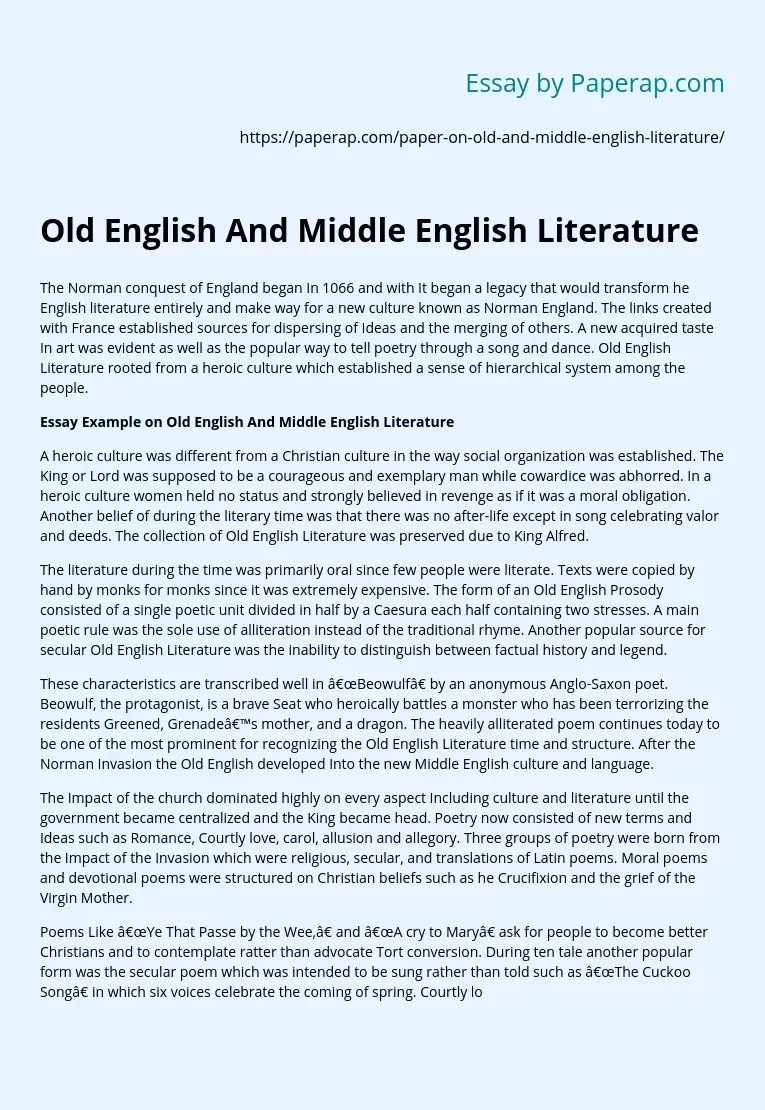Old English And Middle English Literature
The Norman conquest of England began In 1066 and with It began a legacy that would transform he English literature entirely and make way for a new culture known as Norman England. The links created with France established sources for dispersing of Ideas and the merging of others. A new acquired taste In art was evident as well as the popular way to tell poetry through a song and dance. Old English Literature rooted from a heroic culture which established a sense of hierarchical system among the people.
Essay Example on Old English And Middle English Literature
A heroic culture was different from a Christian culture in the way social organization was established. The King or Lord was supposed to be a courageous and exemplary man while cowardice was abhorred. In a heroic culture women held no status and strongly believed in revenge as if it was a moral obligation. Another belief of during the literary time was that there was no after-life except in song celebrating valor and deeds.
The collection of Old English Literature was preserved due to King Alfred.
The literature during the time was primarily oral since few people were literate. Texts were copied by hand by monks for monks since it was extremely expensive. The form of an Old English Prosody consisted of a single poetic unit divided in half by a Caesura each half containing two stresses. A main poetic rule was the sole use of alliteration instead of the traditional rhyme. Another popular source for secular Old English Literature was the inability to distinguish between factual history and legend.
These characteristics are transcribed well in “Beowulf” by an anonymous Anglo-Saxon poet. Beowulf, the protagonist, is a brave Seat who heroically battles a monster who has been terrorizing the residents Greened, Grenade’s mother, and a dragon. The heavily alliterated poem continues today to be one of the most prominent for recognizing the Old English Literature time and structure. After the Norman Invasion the Old English developed Into the new Middle English culture and language.
The Impact of the church dominated highly on every aspect Including culture and literature until the government became centralized and the King became head. Poetry now consisted of new terms and Ideas such as Romance, Courtly love, carol, allusion and allegory. Three groups of poetry were born from the Impact of the Invasion which were religious, secular, and translations of Latin poems. Moral poems and devotional poems were structured on Christian beliefs such as he Crucifixion and the grief of the Virgin Mother.
Poems Like “Ye That Passe by the Wee,” and “A cry to Mary” ask for people to become better Christians and to contemplate ratter than advocate Tort conversion. During ten tale another popular form was the secular poem which was intended to be sung rather than told such as “The Cuckoo Song” in which six voices celebrate the coming of spring. Courtly love was also dominant in Middle English Literature as it was in “Alison” by Francesco Patriarch. In the poem the speaker complains of the great pain the love he has for Alison causes him.
Male-female romance is exaggerated and written about in most of the poetry from the Middle English period as well. The Anglo-Saxon period did bring a lot of poems during the 1 lath and 15th centuries which can avidly be distinguished as the Norman Invasion took place. When the Norman came, they brought with them a whole new culture and language which can be seen in the poetry that is left behind. The replacement of conventional rules and Old English literature with the Middle English was not a complete loss for tradition but also aided literature in becoming better and innovated.
Old English And Middle English Literature. (2019, Nov 27). Retrieved from https://paperap.com/paper-on-old-and-middle-english-literature/

